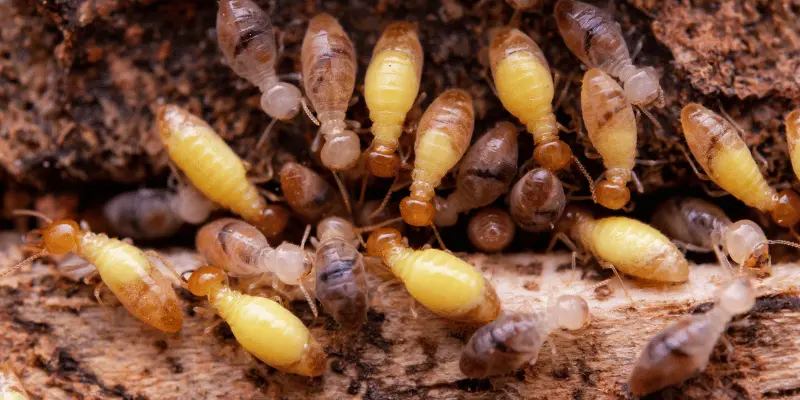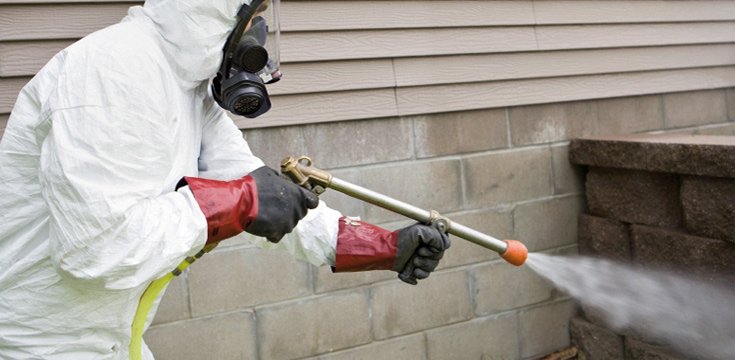Comprehensive Termite Control: Shield Your Residential Property with Specialist Services
Comprehensive Termite Control: Shield Your Residential Property with Specialist Services
Blog Article
Ecological Effect of Pest Control: Harmonizing Efficiency With Sustainability
The ecological influence of pest control is a critical problem that needs a fragile equilibrium in between achieving efficiency in taking care of pests and guaranteeing sustainability of our communities. From the use of dangerous chemicals that permeate right into our dirt and water to the unplanned consequences on non-target species, the repercussions of traditional insect control techniques are far-ranging.
Damaging Chemicals in Bug Control
The application of unsafe chemicals in insect control postures substantial ecological and wellness threats that call for cautious factor to consider and reduction methods. Herbicides, pesticides, and insecticides are frequently utilized to eliminate insects, but their widespread application can bring about unintended effects. These chemicals can infect dirt, water sources, and the air, affecting not just the targeted insects yet also useful insects, wild animals, and people.

To deal with these risks, integrated insect administration (IPM) techniques are being promoted as an extra lasting choice. IPM entails a mix of techniques such as biological control, environment manipulation, and the targeted usage of chemicals as a last resort (ant control mint hill nc). By adopting a holistic method to pest control, we can reduce the environmental and wellness effects related to hazardous chemicals while properly taking care of pest populations
Effect On Non-Target Variety
Thinking about the unintended effects of insect control methods, the effect on non-target species is a vital facet that needs comprehensive evaluation. While parasite control measures aim to target specific bugs, other organisms in the ecosystem may be inadvertently impacted. Non-target species, including beneficial pests, birds, mammals, and also plants, can suffer direct or indirect injury from pesticide applications or organic control techniques.
Chemicals can have lethal or sub-lethal results on non-target types. Insecticides created to battle a particular insect bug might hurt pollinators like or natural killers such as ladybugs. In addition, chemical residues can build up in the environment, influencing non-target microorganisms over time. Likewise, organic control representatives, otherwise species-specific, can pose dangers to unintentional targets, interfering with the ecological balance.
To minimize the effect on non-target types, integrated insect administration (IPM) methods that highlight an alternative method to pest control are recommended. These methods focus on the use of environmentally pleasant practices, lessening harm to valuable organisms while effectively managing pest populaces. Conducting comprehensive risk assessments and keeping track of the outcomes of parasite control initiatives are essential action in securing non-target types and promoting total environment health and wellness.
Soil and Water Contamination
Unplanned environmental consequences of bug control approaches prolong past affecting non-target types, with substantial implications for soil and water contamination - ant control services. Pesticides, herbicides, and chemical plant foods used in insect control can leach right into the dirt and contaminate groundwater, presenting a hazard to both water and terrestrial ecological communities.
Water contamination is another critical issue connected with insect control methods. Overflow from farming areas treated with chemicals can carry these chemicals right into nearby water bodies, affecting aquatic organisms and water top quality. Contaminants in water sources can have far-reaching consequences, impacting not only water life yet additionally human wellness via the intake of polluted water or water microorganisms. To minimize dirt and water contamination from bug control activities, integrated pest management strategies that prioritize sustainability and minimize chemical inputs are essential.
Air Contamination From Pesticide Usage
Direct exposure to airborne chemicals during agricultural applications poses a considerable worry for air pollution control measures. When chemicals are sprayed onto crops, they can volatilize right into the air and kind unstable organic substances (VOCs) and various other air-borne pollutants. These chemicals can add to the look at this website development of ground-level ozone, a major part of smog that can have harmful results on human health and wellness, plant efficiency, and general air quality. Additionally, pesticide drift, where chemicals are carried by the wind to unplanned areas, can lead to the contamination of neighboring communities and water bodies.

Techniques for Sustainable Insect Control
In the realm of agricultural techniques, executing sustainable bug control approaches is critical for keeping ecological balance and securing plant returns. Lasting parasite control stresses making use of eco-friendly methods to manage insect populations effectively while reducing damage to non-target microorganisms and ecological communities. Integrated Insect Management (IPM) is a widely taken on method that integrates organic, social, physical, and chemical control approaches to achieve lasting insect management solutions.
One key technique in lasting bug control is advertising biodiversity within agroecosystems. By improving all-natural opponents of parasites, such as parasitoids and predators, farmers can decrease the requirement for synthetic chemicals. Crop turning and diversification are additionally efficient strategies to disrupt pest life process and create less beneficial problems for bugs to flourish. Furthermore, using pest-resistant crop varieties and using strategies like trap chopping can help in reducing parasite pressure without depending heavily on chemical interventions. Inevitably, by incorporating these sustainable bug control techniques, farmers can attain a balance between pest management efficiency and ecological stewardship.
Verdict
To conclude, the ecological effect of parasite control approaches have to be carefully taken into consideration to stabilize effectiveness with sustainability. Hazardous chemicals made use of in bug control can bring about soil and water contamination, air pollution, and damage non-target types - ant control. It is important to implement sustainable insect control techniques to minimize these negative effects on the atmosphere and promote a much healthier community for future generations
By adopting an all natural approach to pest control, we can decrease the ecological and wellness impacts linked with unsafe chemicals while properly managing pest populaces.

To minimize the air pollution caused by chemical use, it is crucial to embrace integrated parasite monitoring techniques that focus on the use of non-chemical pest control approaches, such as crop turning, natural killers, and immune plant varieties. Sustainable insect control stresses the usage of environmentally friendly methods to manage parasite populations effectively while decreasing damage to non-target organisms and ecological communities. Integrated Insect Management (IPM) is a commonly adopted method that integrates organic, cultural, physical, and chemical control methods to achieve long-term bug management remedies.
Report this page